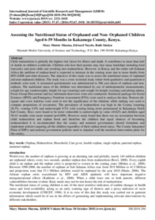Displaying 91 - 100 of 243
The aim of this study was to improve the mean time to initial foster care evaluation (TIE) from 32 to <7 days within 12 months for children in FC in Durham County, North Carolina.
The objective of this study was to assess the nutritional status of orphaned and non-orphaned children in Kenya.
The purpose of this study was to assess vaccine coverage for a cohort of children who have been in the care of the child welfare system compared to children in the general population in Alberta, Canada.
The purpose of this paper is to validate measures of professional self-efficacy for detecting and responding to child abuse and neglect presentations, and then evaluate a clinical training programme for health professionals in a tertiary-level hospital in Vietnam.
International research has consistently reported that youth in secure residential care have high rates of somatic/dental health problems. Here, the authors report results from the first such study in a Nordic country.
The authors of this paper aimed to examine the available evidence on the impact of overseas parental migration on healthcare seeking for common childhood illnesses and the nutritional status of children left-behind under five years of age.
The aim of this study was to assess the nutritional status of children residing at an orphanage.
The objective of the study was to assess the knowledge and practices regarding menstrual hygiene among adolescent girls residing in selected orphanages of Haryana.
The objectives of this study were to examine the prevalence and type of trauma exposure, and investigate the relationship between prior trauma and serious illness among foster children at end of life.
The researchers in this study conducted formative research on mental health issues and HIV/STI risk behavior in Kasarani, a large slum in Nairobi, to guide the development of future interventions.

